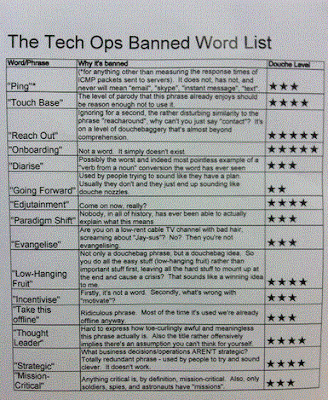This image made a few waves on Facebook a couple of days ago.
And of course people poured their derision on it, proclaiming how terrible these terms were, how they rob the English language of grace and beauty and how the people who use these terms are douchebags.
Normally, I'm quite a stickler for good English and I'm one of those grammar nazis whose blood boils when seeing "it's" instead of "its", "their" instead of "there".
But this list is nothing but a lame attempt at spraying some condescending "I'm better than you" vitriol on newly evolving language that serves a good purpose.
Cases in point - let's have a closer look.
1. The list derides the word "to ping" and that it never meant to mean "contacting". Well, it does now. Get used to it. What's the problem with applying a term from computer engineering to a broader set of circumstances outside of its original realm?
2. "Paradigm Shift" - the author of the list crows that "no one has ever been able to explain what this means". Well, here comes my definition, author. A paradigm shift is a term that describes the process of changing one's vantage point to see a set of circumstances differently and deriving from this a new set of behaviours that can lead to beneficial outcomes. Example: Zappos revolutionized customer service by not seeing it as operational expense but rather as marketing investment and thus became widely admired for outstanding treatment of their customers. A paradigm shift if there ever was one.
Bon appetit with your words, list author.
3. "Thought leader." here a straw man is being built up by saying that users of this term confine everyone else to not be able to think for themselves. This is obvious bollocks. Only because you're not LEADING it doesn't mean that you can't think for yourself. Take Malcolm Gladwell. He popularized the concept of the Tipping Point and provided a framework for looking at interesting social phenomena in the light of how epidemics spread. On the contrary, I have not come up with anything similarly interesting. I am NOT a thought leader. I may have done some great work in other areas of life but I have not contributed to collective human knowledge in the same way as Gladwell has. He is a thought leader. I am not (yet).
Similarly, many other list items can be unpicked. For example, saying that "onboarding" doesn't exist. Well if enough people use it, it DOES exist. And it describes something useful: Namely the acquainting of new members of an organization with the workings and procedures of said organization. "Low hanging fruit" apparently is a douchy concept because, according to the list author, it means neglecting the difficult problems. That's like saying a knife is evil because one can do evil things with it. Using the term to describe something is a bit of a different kettle of fish compared to laziness and procrastination, no?
It is a particular kind of douchebaggery to try to censor newly evolving concepts and terminology and backing it up with your own ignorance and unwillingness to allow language to develop.
Yes - there are too many startups who claim to be "disruptive" while they are not. Too many people on linkedin describing themselves as "dynamic self-starters". Bullshit bingo does abound.
However, I claim that the problem lies in the actual unwarranted application of grandiose terms to circumstances that do not deserve them (e.g. claiming to be a disruptive business all the while you're just another photo sharing app) rather than in the usage of the words themselves. Some decisions ARE indeed strategic, some projects ARE mission critical and some people ARE thought leaders. Let's keep calling a spade a spade and not compensate for mediocrity with verbosity.

0 comments:
Post a Comment